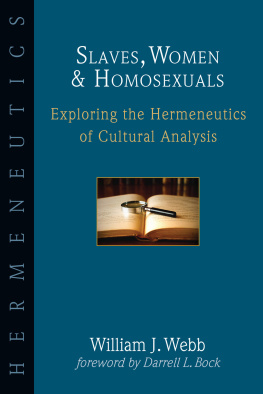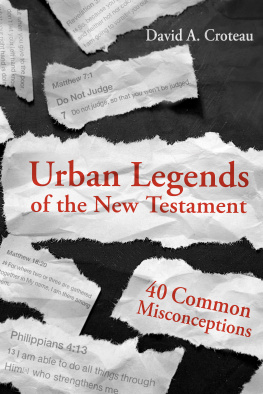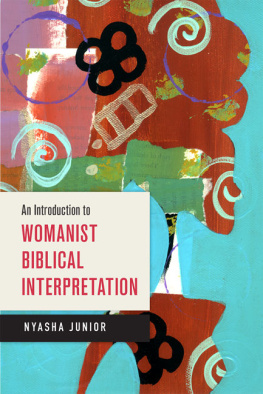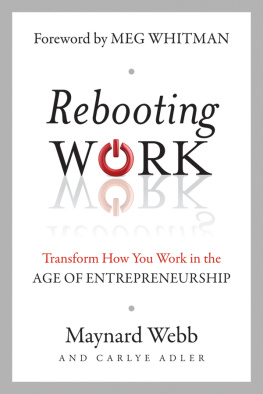Abbreviations
ANE | Ancient Near East(ern) |
AOTC | Abingdon Old Testament Commentaries |
BCOTWP | Baker Commentary on the Old Testament Wisdom and Psalms |
HL | Hittite Laws |
ITC | International Theological Commentary |
LH | Laws of Hammurabi |
MAL | Middle Assyrian Laws |
MAPD | Middle Assyrian Palace Decrees |
MH | Letters Middle Hittite Letters |
NAC | New American Commentary |
NIBC | New International Biblical Commentary |
NICOT | New International Commentary on the Old Testament |
NIVAC | New International Version Application Commentary |
OBT | Overtures to Biblical Theology |
OTS | Old Testament Studies |
SBL | Studies in Biblical Literature |
SHBC | Smith & Helwys Bible Commentary |
VTSup | Supplements to Vetus Testamentum |
Acknowledgments
T his book has come into being through the contributions of many people. I must thank the staff at InterVarsity Press for their unfailing patience in working with probably the most delinquent author they have ever signed on. When we got the diagnosis of leukodystrophy with Jon (our oldest son), it meant a lot of changes for our family. Andy Le Peau and Gary Deddo met with me several times, once in San Diego with both Marilyn and myself. They prayed with us and assured us that they wanted to see a couple of overdue books come to completion. To my surprise they were not interested in closing out the overdue contracts. As of last summer Jon is now in a full-time care home just north of Waterloo, Ontario, and our lives are beginning to return to normal. I must express special thanks to Gary for helping me articulate the intersecting relationship between ethics and hermeneutics in an explicit fashionsome things remain dormant in ones mind until a perceptive editor offers some prodding questions. So thanks from myself and Marilyn to the entire IVP staff for your encouragement and blessing in our lives.
Many academic colleagues and friends have read over some or all of the chapters in this book. I thank my colleagues at Heritage College and Seminary for an unforgettable twenty-two-year pilgrimage togethertheir support and delightful exchange have made those years a cherished memory. I want to especially thank those who read and offered feedback on this book during its formationGord Oeste, Kelvin Mutter, Stan Fowler, David Smith, Cyril Guerette, David Barker, Paul Wilson, Cheryl Belch and Jim Cianca. I was also fortunate to receive input from several persons in pastoral ministryin particular I wish to thank Rod Casey for his sustained encouragement and perceptive interaction. Mart DeHaan was kind enough to read the manuscript several times during its early stages and assist me in some crucial communication issues. Two gifted editorsDorian Coover-Cox and Robert L. Webbgave countless hours helping me write clearly and choose apt words. Their generous labors and friendship have been an inspiration and have produced a much better manuscript. In the final hours of finishing this project, when I was swamped with some other pressing matters, my youngest son, Joel (now a first-year university student!), gladly pitched in and developed the author indexa more wonderful gift I could not have had.
Finally, there is a group of close friends known as our gourm clubmade up of Christians from various walks of life ( gourm is short for gourmet). This eclectic group of five couples includes a teacher, a principal, a teaching assistant, four professors, a financial adviser, an administrative assistant, and a family and marriage counselor. We meet a half dozen times throughout the year and cook some fabulous dinners over four or five hours of conversation. The contents of these chapters were often bantered around among these long-time friends in both a playful and serious manner, depending on the moment. These friends stood with me through this past year, which has been a challenging period of transition.
At the end of this year I find myself as an adjunct professor at Tyndale Seminary in Toronto, Ontario. This acclaimed seminary within Canada has been gracious in offering me an academic home. I wish to thank the faculty of Tyndale Seminary and in particular the dean, Janet Clark, for your kind welcome and for giving me a place to hang my hat. I am indeed grateful to them.
Appendix
A Response to Andreas Kstenberger
A fter this book was finished, Andreas Kstenberger (along with David W. Jones) published a second edition of God, Marriage and Family (2010). In this updated edition Nevertheless, his objections deserve a response. I will cite each objection first and then respond.
Objection 1: Straw Man Logical Fallacy
First, Webb committed the straw man fallacy by mischaracterizing the hermeneutics of his opponents. He assumed that they followed a rigid literalism by stating that if one were to advocate a biblical view of corporal punishment, one must embrace the full severity described in various legal texts. Webb seemed to think that spanking proponents operated under some sort of fundamentalist hermeneutic that required the strictest, most concrete, and woodenly literal interpretation of Scripture without regard for genre and other issues related to special hermeneutics. He also inadequately discerned the underlying principle in administering physical discipline, that is, loving correction, and insufficiently appreciated the fact that spanking is but one among many forms of parental discipline practiced.
I do not assume that Kstenberger has a hermeneutic of rigid literalism. Kstenbergers response misses the point of the critique. My critique of Kstenberger and other evangelical pro-spankers is that they have not explained their hermeneutic in two key ways: (1) How do they move from the beatings with the rod texts to the contemporary practice of hitting children in their two-smacks-max spanking position? Why is the literal hitting aspect preserved from the corporal punishment texts while other literal aspects are not? Why do they move away from various harsh aspects of corporal punishment instructions in the Proverbs but stay with hitting children? (2) Why do they herald the two-smacks-max position as upholding biblical authority and conversely view an alternative-discipline-only position as undermining biblical authority? In other words, I find that Kstenbergers not rigid literalism hermeneutic has failed to answer these two groups of questions in a convincing fashion. To label my view as a straw man fallacy is really to miss the pointor perhaps to avoid it.
When it comes to not discerning the underlying principle in administering physical discipline, that is, loving correction, I respond with the following questions. If the underlying principle in the proverbs about beating children with the rod is loving correction (that is the principle), then doesnt this affirmation of loving correction the texts abstracted meaningopen the door for leaving two-smacks-max behind and moving to alternative-discipline-only methods? If alternative-discipline-only methods offer effective means of child discipline (as chap. 5 and the postscript show), then is it not possible to talk about ethical and redemptive development in the application of that loving correction principle and about what the loving correction principle might look like in our contemporary context?
Several further comments respond to the charge that I insufficiently appreciated the fact that spanking is but one among many forms of parental discipline practiced. First, I admit some failure and apologize for lack of clarity on this point in the short (30 mins.) 2007 paper. I have never thought nor intended to imply that two-smacks-max advocates promoted In Corporal Punishment in the Bible this distinction about the precise nature of the spanking debate (two-smacks-max versus alternative-discipline-only) has been made explicit and painstakingly clear.









